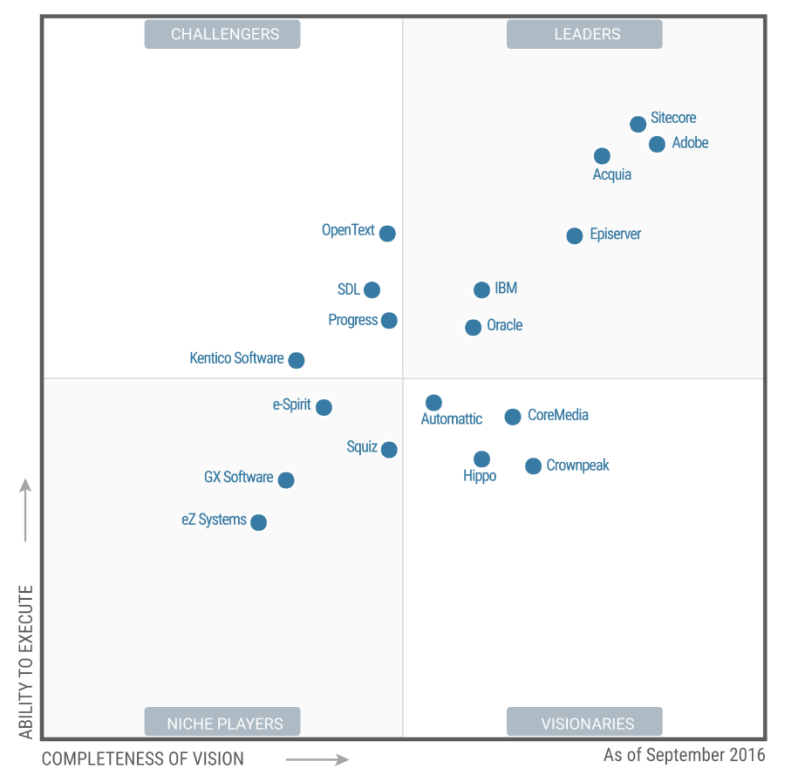Recently I was asked to list down why Sitecore is an ideal choice as content management system, you can find articles advocating for Sitecore and explaining the features which makes it an optimal choice as a content management system, here I want to share my view on why Sitecore is the best choice.
Before we start, just to mention that Sitecore has been awarded as a leader in Gartner’s assessment of the strengths and cautions of 18 web content management vendors for 9th year in the row.

Here are some of the features/advantages of Sitecore from my perspective which makes it a product of “one stop shop” for all.
Friendly Interface
Sitecore user interface was made keeping usability in mind. With its intuitive interface, even non-technical users can make changes and updates on the fly.
Multisite development
Sitecore’s feature of Multisite development enables development team to work on multiple websites at the same time, this includes microsites/intranets applications and etc.
Sitecore Integration architecture
Sitecore architecture is based on extensibility which supports integration with third party systems,you can integrate some of the third party systems like Salesforce/Active Directory/Brightcove connectors and etc. in your Sitecore solution smoothly.
Multilingual Sites and translations
Sitecore helps your business to reach out to global or local market by translating the contents into regional languages by means of different connectors which can use to translate the content into different languages.you can translate the content manually or make use of connectors- choice is yours.
Sitecore Experience Analytics
Experience Analytics is built in which gives business editors/users an insight of customer behavior and journey so that we can recognize patterns and update the content and personalize to present more relevant contents to end users.
Devices
System can target the content based on devices which has been used to request particular page.
Scalability
You can scale your application to any level you want right from content management servers to your experience database(xDB) and content delivery servers. Sitecore provides a system to make sure your data is safe and protected. We can setup multiple CD servers to load balance the traffic and making sure the nearest server is being used to serve the user request to improve the performance.
Extensive Support from Sitecore
You are always in safe hand while working in Sitecore, for any issues and problems Sitecore has different channels available where you can raise your concerns and queries. Some of the tools which you can use are as follows:
- support.sitecore.net
- Sitecore slack
- Sitecore stackoverflow
- dev.sitecore.net
Deploy on Azure
We can deploy Sitecore on Azure using modals like PAAS and IAAS, and can leverage other cloud features to best serve the application and users.
SXA (Sitecore Experience Accelerator)
SXA Speeds up the delivery while running different work steams in parallel.
- Web development teams use Sitecore Experience Accelerator (SXA) to speed up the production of websites and to reuse components, layouts, and templates across a variety of sites.
- SXA separates structure from design, so front-end designers, creative designers, content authors, and developers can work in parallel and you can deploy and maintain multiple sites quickly and cost effectively
- Once a basic user experience plan is in place, everyone can get started on the platform
- For example: the content author can start entering the content in the wireframe environment, while the front-end developer works on the theme, and the developer sets up the data templates.
Personalization
- Personalization is all about presenting relevant content to end users based on several factors like browsing history, campaigns, goals, visits and etc.
- Sitecore comes handy with several out of the personalization rules which you can use out of the box.
- We can also built custom rules to create and show specific component variant which can be displayed when custom personalization rule/condition is met.
Marketing Automation
Business editors can make use of marketing automation feature to automate several steps and process which saves time like sending email when specific goal is triggered and etc.
Sitecore Experience profile
A profile is created for each site visitor (anonymous/known) and stores all related information into Experience Profile section while fetching the values from experience database(xDB).
Helix/Habitat (Design principles)
- Helix is a set of overall design principles and conventions for Sitecore development.
- As more and more people and organisations adopt the Helix conventions and principles, it will become a Sitecore standard.
- This means that people who are familiar with the conventions or the Habitat example will be able to work more easily on other convention-based projects with minimal training
- It will be easier for Sitecore Product Support to understand projects built using the conventions, enabling them to resolve issues more quickly.
Article was originally published on Ankit Joshi's Sitecore blog: Why Sitecore-from my view







